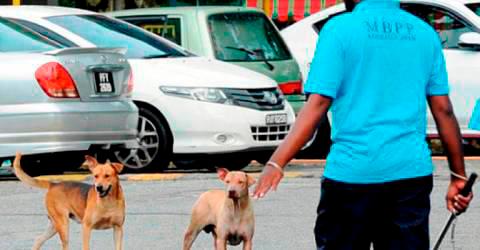PETALING JAYA: The Selangor Veterinary Services Department has expanded its rabies surveillance from a 1km radius to 10km, to collect brain samples from stray dogs after two cases were detected in the state. The expanded areas involve the Hulu Langat, Sepang, Kuala Lumpur and Putrajaya districts.
Its director, Dr Hassuzana Khalil said so far, results from the brain samples that were sent to the Veterinary Research Institute in Ipoh returned negative. She said investigations started within a 1km radius following the death of a man who was bitten by a rabid dog in the Petaling district.
“The victim died two months later after he was bitten. The department is querying his relatives and friends to ascertain if they had seen the dog that had bitten him.
“We are receiving assistance from the local authorities such as the Sepang and Kuala Langat Municipal Councils in this operation,” she told theSun.
Hassuzana said cooperation from residents is critical as the information provided can assist department personnel to identify dogs that show signs of aggression or illness. This will enable the department to capture the dogs for immediate diagnosis.
She also cautioned residents who neglected their pets. She said such an attitude must change as animal faeces in public places contributes to environmental pollution, nuisance and the spread of diseases. Residents are advised to spay their pets to control the animal population.
“Rabies is a zoonotic disease and is fatal since there is no specific treatment for it,” Hassuzana said, adding that eliminating rabid animals is an important task carried out by the authorities.
“Early diagnosis, prompt action to eliminate rabid animals and disposal of their carcasses are important measures that can be carried out to control the spread of the disease.
“However, the department always follows recommended animal disposal procedures so that animals can be euthanised humanely.”
The department also affirmed that it does not intend to vaccinate stray dogs because no dog has been confirmed positive for rabies. However, Hassuzana advised pet owners to vaccinate their dogs against rabies at any veterinary clinic.
She urged residents not to panic because the reported case is isolated and to date, no other dog-bite cases have been reported.
“The department will continue to conduct campaigns to increase awareness and understanding among residents about rabies so that they will be more careful and vigilant, especially in plantations, abandoned buildings and housing areas.
“The department also advised Selangor residents not to provoke dogs or cats because these animals tend to bite to defend themselves,” she said.
Universiti Putra Malaysia Faculty of Veterinary Medicine Prof Dr Siti Suri Arshad said the public should be on high alert for rabid animals as the fatality rate once bitten is almost 100% in humans and animals.
She said rabies remains a global threat, killing approximately 59,000 people annually.
“Rabies is a virus that attacks the central nervous system. An infected person who is not treated before symptoms appear could die from the disease,” she said, adding that rabies has the highest mortality rate compared with other diseases.
Siti Suri said while people usually get rabies from the bite of a rabid animal, non-bite exposures are also possible when scratches, abrasions or open wounds are exposed to saliva or the nervous system of a rabid animal.









